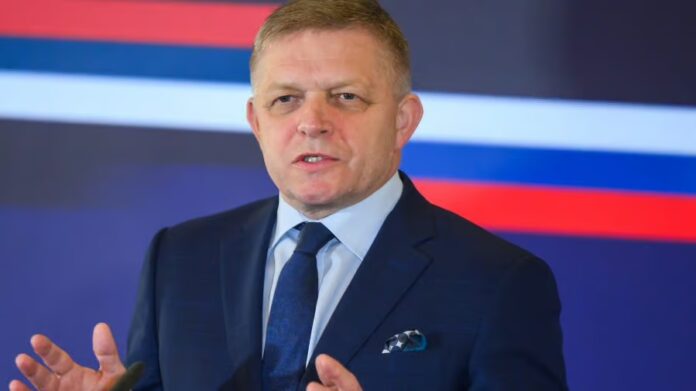Slovak Prime Minister Robert Fico has accused Ukrainian President Volodymyr Zelensky of offering €500 million to secure Slovakia’s support for Ukraine’s NATO bid, rejecting the alleged proposal as “unrealistic” and exposing details from a confidential meeting. Fico further threatened to reconsider Slovakia’s aid to Ukraine, accusing Zelensky of blocking gas transit and dismissing Kyiv’s counteroffer to waive fees until the war ends. His remarks signal growing tensions between the two nations and risk isolating Slovakia within NATO and the EU.
Slovak Prime Minister Robert Fico has accused Ukrainian President Volodymyr Zelensky of offering a €500 million incentive to secure Slovakia’s backing for Ukraine’s NATO membership bid. In a striking revelation made during a Facebook address, Fico claimed Zelensky posed the question directly: “Would you vote for Ukraine’s NATO membership if I gave you €500 million from Russian assets?” Fico’s response was resolute—“Never.”
This extraordinary allegation adds a volatile dimension to already strained relations between Slovakia and Ukraine. If true, the proposition reflects the high stakes surrounding Ukraine’s pursuit of NATO membership amid ongoing Russian aggression. Fico’s decision to publicly reveal the exchange – reportedly made during a confidential, off-the-record meeting – suggests deliberate contempt for Zelensky’s proposal. In diplomatic contexts, leaking private discussions often signals an intent to undermine or discredit the counterpart’s position. Fico’s disclosure not only risks destabilising diplomatic channels but could further complicate NATO’s balancing act regarding Kyiv’s accession.
Fico’s blunt rejection underscores his long-standing scepticism toward Ukraine’s NATO aspirations, a stance that mirrors the Kremlin’s opposition to Ukraine’s integration into Western security structures. He remarked, “You know my position on Ukraine joining NATO. It is completely unrealistic,” signalling that no financial incentive could sway his opposition.
Fico Questions Slovak Support for Ukraine, Threatens Retaliation Over Gas Dispute
Beyond the NATO controversy, Fico delved into tensions over energy policy, recounting his disagreement with Zelensky regarding gas transit. According to Fico, Ukraine has refused to allow Slovakia to transit non-Russian gas through Ukrainian pipelines. “The President ruled out any possibility that Ukraine could transit practically any gas,” Fico explained, expressing frustration at Zelensky’s firm stance.
Zelensky’s counteroffer, as described by Fico, proposed suspending transit fees until the war ends—a suggestion the Slovak leader rejected outright. “What kind of fool would give us gas for free?” he said, portraying Ukraine’s position as unreasonable and detrimental to Slovakia’s energy security.
Fico’s rhetoric suggests that Slovakia could adopt reciprocal measures if Ukraine continues blocking gas transit. This confrontational tone not only risks exacerbating bilateral relations but also plays into Russia’s longstanding strategy of using energy as a wedge to divide European nations.
Further amplifying his frustrations, Fico questioned why Slovakia should continue providing aid to Ukraine under such circumstances. “How am I supposed to explain to the Slovak public that we continue to send electricity and humanitarian aid when Zelensky has essentially told us to get lost?” he asked, echoing sentiments that reflect growing fatigue within Slovakia regarding prolonged support for Ukraine.
A Categorical Rejection of Ukraine’s NATO Membership
Fico’s categorical dismissal of Ukraine’s NATO membership bid represents the core of his divergence from broader Western policies. His assertion that Ukraine’s NATO accession is “completely unrealistic” aligns closely with Russian foreign policy objectives, which aim to prevent Kyiv from integrating into Western alliances.
By framing Ukraine’s ambitions as unattainable, Fico not only distances Slovakia from NATO’s collective stance but also signals to Moscow that Slovakia may serve as a dissenting voice within the alliance. This rhetoric risks undermining NATO’s cohesion and emboldening Russia’s belief that European unity on Ukraine can be fractured.
While Fico frames his position as safeguarding Slovakia’s national interests, the broader implications suggest otherwise. His opposition to Ukraine’s NATO bid, alongside grievances over energy disputes, increasingly isolates Slovakia within the EU and NATO. This trajectory leaves the country vulnerable to greater Russian influence and economic coercion, eroding collective European resilience against Moscow’s aggression.
Fico’s Facebook address reveals a troubling shift in Slovak foreign policy that cannot be dismissed as mere domestic posturing. By publicly exposing sensitive diplomatic exchanges, Fico signals a departure from quiet diplomacy in favour of populist rhetoric that mirrors Kremlin narratives. This shift, if left unchecked, could weaken European efforts to counter Russian aggression and jeopardise the fragile security architecture of Eastern Europe.







